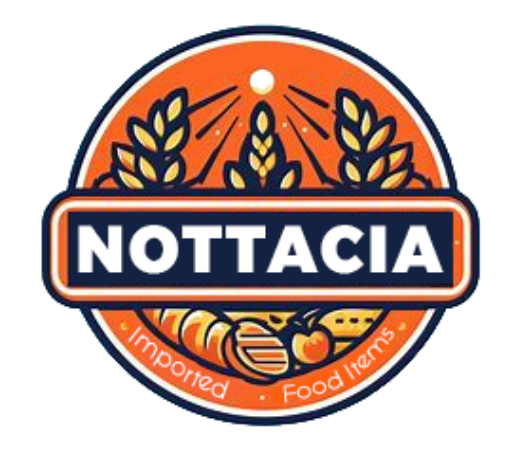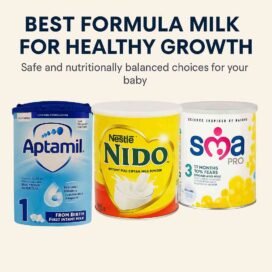Selecting the best nutrition for your baby is one of the most significant decisions a parent makes. For the first couple of years of life, good nutrition is essential to physical growth, brain growth, and building a solid immune system. Breastfeeding is recommended across the board, but many parents will exclusively or in conjunction add infant formula milk as a full or partial source of infant nutrition.
Among the leading brands, Aptamil Infant Formula has gained the reliability and trust of parents and pediatricians around the world. Aptamil Infant Formula is developed over the past 40 years of breast milk research and is designed to help provide the important nutrients that support your baby’s growth and immune system.
In this article, we will break down the types of Aptamil Infant Formula in detail, look at its core ingredients and nutritional benefits, and help you determine which Aptamil formula is appropriate for your baby’s nutrition.
What Is Aptamil Infant Formula?
Aptamil Infant Formula is a carefully formulated milk-based substitute that gives complete nutrition for babies from birth until they are toddlers. This Infant Formula is specifically designed to resemble the structure and benefits of breast milk, so you can feel confident that your baby is receiving all the nourishment necessary for healthy growth and development, whether you are partially or fully formula-feeding.
Produced by Danone Nutricia, Aptamil is enriched with nutrients, such as DHA, ARA, GOS/FOS prebiotics, nucleotides, iron, calcium, and vitamins A, C, and D. These nutrients work together to help establish strong bones, develop a healthy gut, support brain development and function, and boost the immune system.
How Many Types of Aptamil Infant Formula
There are a variety of Aptamil formulas that offer nourishment to infants through their developmental stages.
Below are some of the most common types of Aptamil baby formula:
1. Aptamil Stage 1 (0-6 Months)
This is specifically designed for infants up to 6 months old and supplies balanced nutrition in the early stage of infant development.
Contains DHA and ARA for brain and vision development.
- Includes GOS/FOS prebiotic blend to assist with healthy gut flora.
- Provides gentle digestion for a baby moving from breast milk.
2. Aptamil Stage 2 (6–12 Months)
Aptamil Stage 2 follow-on formula supports babies as they begin solids and experience faster growth.
- Has an increased iron content to aid brain development.
- Supports immunity with vitamins and minerals essential for development.
- Smoothly bridges the feeding journey after Aptamil Stage 1 or breastmilk.
3. Aptamil Stage 3 (12–24 Months)
Aptamil Stage 3 is formulated for toddlers with higher levels of activity and different nutritional requirements.
- Delivers nutrients that complement a varied diet and solid foods.
- Provides support for developing strong bones, brain function, and a strong immune system.
- Includes calcium, vitamin D, and DHA for healthy development.
4. Aptamil Gold Range
An upgraded formula that contains extra ingredients and enhances the digestion process.
- Contains an exclusive prebiotic oligosaccharide blend that helps the good bacteria in the gut thrive.
- Contains nucleotides that provide immune support.
- Provides an ideal balance of proteins and fats for nutrient absorption in the gut.
5. Aptamil Hypoallergenic (HA) Formula
This formula is designed for babies who have a predisposition to allergies or a family history of allergies.
- This formula contains partially hydrolyzed proteins, which means there is less risk of allergic reactions and it’s easier to digest.
- It is recommended for babies with hypersensitive stomachs.
6. Aptamil Lactose-Free Formula
Recommended for infants with lactose sensitivities.
- Provides required nutrients without the presence of lactose.
- Gentle digestion while maintaining nutritional balance.
What are the Major Ingredients of Aptamil Infant Formula and Their Advantages
Aptamil’s formula is developed around key research into the nutritional composition of breast milk, so let’s talk about its key ingredients and their special benefits.
1. DHA (Docosahexaenoic Acid) and ARA (Arachidonic Acid)
These omega-3 and omega-6 fatty acids are critical for the growth and development of your baby’s brain and eyes. They will also aid in supporting memory, attention, and visual development as your baby matures.
2. GOS/FOS Prebiotic Blend (Galacto- and Fructo-oligosaccharides)
This mixture promotes a selective growth of beneficial bacteria in the gut, promoting digestion and immunity.
3. Nucleotides
These organic molecules contribute to cellular repair and immunity and help your baby’s body respond to infections and to develop its own antibodies naturally.
4. Vitamins and Minerals
Aptamil is supplemented with important vitamins, including A, C, D, E, and K, and minerals such as iron, calcium, and zinc.
- Vitamin C and zinc help with immunity.
- Iron supports healthy blood and brain development.
5. High-Quality Proteins
Aptamil has a specially balanced mixture of whey and casein protein to accommodate little bellies, while assisting with digestive issues/digestion, and growth.
6. LCPs (Long-Chain Polyunsaturated Fatty Acids)
LCPs will also help to support eye development and proper neural connections, leading to improved overall cognitive function in your baby.
7. Carbohydrates (Lactose)
Lactose is the main carbohydrate in the Aptamil formula. Lactose gives a steady supply of energy and helps with calcium absorption.
Nutritional Benefits of Aptamil Baby Formula
1. Supports Brain and Vision Development
- DHA and ARA aid in healthy neural development, as well as visual sharpness.
- Ongoing consumption benefits memory, learning, and attention.
2. Builds a Strong Immune System
- Prebiotics and nucleotides support the formation of a protective layer of healthy bacteria in the gut.
- Vitamins A, C, and D work in combination to support immunity.
3. Promotes Healthy Digestion
- Prebiotic mixtures facilitate the formation of soft stools and help to avoid constipation.
- Gentle proteins alleviate gas, bloating, and discomfort.
4. Encourages Strong Bones and Muscles
- Calcium and vitamin D promote the healthy growth of bones.
- A balanced proportion of nutrients can help with bone and mineral development.
5. Ensures Consistent Growth and Development
Aptamil provides the right balanced nutrition to promote weight gain, muscle growth, and height growth.
6. Provides a Reliable Alternative to Breast Milk.
Aptamil represents a scientific formula that is designed for mothers who can not breastfeed or are looking to supplement with a plan.
How to Select the Appropriate Aptamil Formula for Your Baby
The right choice for you depends on your infant’s age, health status, and dietary needs. Following each of the considerations below may help you decide:
1. Age and Growth Stage
Aptamil follows an age-based formula system. Each of Aptamil’s stages engenders new developments in your infant’s life:
Stage 1 (0–6 months) for newborns.
Stage 2 (6 -12 months) for infants when they begin solid food.
Stage 3 (12 – 24 months) for toddlers.
In all cases, it is important to select a formula that is appropriate for your infant’s current stage in life to ensure they receive adequate nutrient ratios.
2. Digestive Comfort and Allergies
If your infant is displaying symptoms of colic, gas, or mild allergies, you may consider a specialty formula. Aptamil offers:
- Aptamil HA (Hypoallergenic) for an allergy-free option.
- Aptamil Lactose-Free for infants diagnosed with lactose intolerance
Please consult with your pediatrician before moving to a specialized formula or discussing with your health care provider if your baby has displayed unusual symptoms of colic, gas, or mild allergy.
3. Nutritional Objectives
- For babies requiring immune support, formulas with nucleotides or prebiotics can be considered.
- Stage 2 or Gold Range may be a formula option for more rapid growth or in babies requiring weight gain because they have a higher nutrient density.
4. Accessibility and Ease of Preparation
Be sure to choose a formula that is readily available and easy to incorporate into your everyday routine. Aptamil baby formula powders are simple to make (and convenient to put in the pantry;) however, be sure to follow the capsules or pouch manufacturer’s preparation instructions for safety, timing, and proportion.
5. Physician’s Recommendation
Your primary care physician knows your baby’s unique nutritional needs and will make the best recommendations for your baby’s needs. Do not frequently switch formulas without medical guidance.
Professional Tips for Making Up Aptamil Baby Formula
- Always ensure you have washed your hands and have sterilized your feeding bottles before you begin the preparation.
- Boil water and let it cool to approximately 40°C before mixing (to avoid damaging the nutrients – always leave the water until it is hot but not too hot to drink).
- Follow the scoop-to-water ratio printed on the packaging.
- Shake the bottle vigorously until the powder has fully dissolved, and always remember to test the temperature before feeding.
- Store the unused formula safely and, as always, do not reheat any leftover milk.
Conclusion
Aptamil Infant Formula provides a comprehensive, evidence-based approach to infant feeding. Aptamil’s combination of essential nutrients, prebiotics, vitamins, and fatty acids supports a baby’s overall development during the critical early utilization years — including immunity, digestion, brain and bone development.
Formulas come in a variety of types suitable for different stages and for specific dietary needs, thereby giving parents a choice in the best option for their baby. Knowing the baby formula types and what they are made of, and their nutritional value, along with how to choose and prepare them appropriately, will help make sure your baby receives top nutrition during this important time.
Nottacia is proud to offer a variety of Aptamil baby formula and baby nutrition products across India, with a specialty in Delhi. Our mission is to aid parents in nurturing healthy choices while feeding their baby, while also guaranteeing that every child receives the love, comfort, and nutrition they are entitled to.
FAQ
Aptamil formula contains a proprietary combination of prebiotics (GOS / FOS) that promotes good digestion and may help with gas and colic. However, if your baby suffers from prolonged colic, consider seeking advice from a pediatrician before trying new formulas.
The healthiest baby formula is one that can closely mimic breast milk, is easy to digest, and provides for your baby’s nutritional needs. Aptamil is considered one of the healthiest formulas as it is packed with nutrients, DHA, and prebiotics, which support immunity and growth.
Aptamil is scientifically constructed to resemble breast milk composition, with DHA, ARA, nucleotides, and prebiotics that support brain development and gut health. Aptamil is one of the closest replacements available on the shelf.
The best Aptamil formula for your baby depends on their age and specialty formula needs. Aptamil Stage 1 is for newborns (0-6 months), Stage 2 is a formula for babies (6-12 months), and Stage 3 is for toddlers (12-24 months).
Aptamil has 40 years of thorough research and a proven formula that includes unique combinations of DHA along with prebiotics, vitamins, and minerals that support immunity, digestive health, and brain development. Aptamil is trusted by millions of parents worldwide.
Aptamil Stage 1 Infant Formula is suitable for newborns up to six months. This infant formula is based on complete nutrition and contains gentle proteins, along with prebiotics, to support a baby’s developing immune and digestive system.
Yes, Aptamil has been created using gentle proteins and a unique prebiotic blend that will actively assist with digestion and ease baby discomfort. Aptamil is suitable even for delicate babies.





[…] Aptamil Baby Formula – Science Backed & Parent Trusted […]